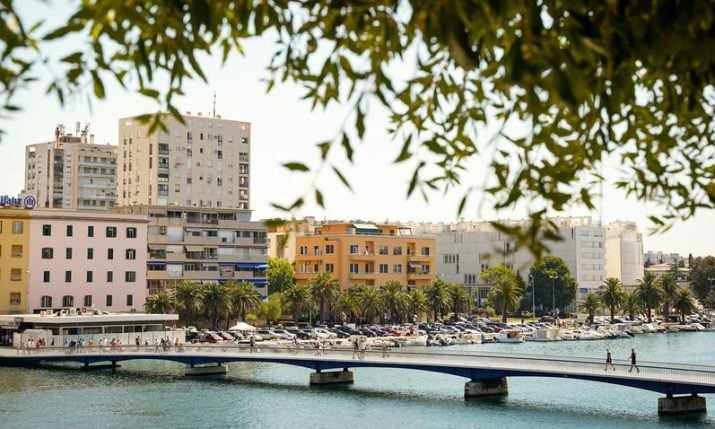Addresses in Knin on Victory & Homeland Thanksgiving Day
- by croatiaweek
- in News
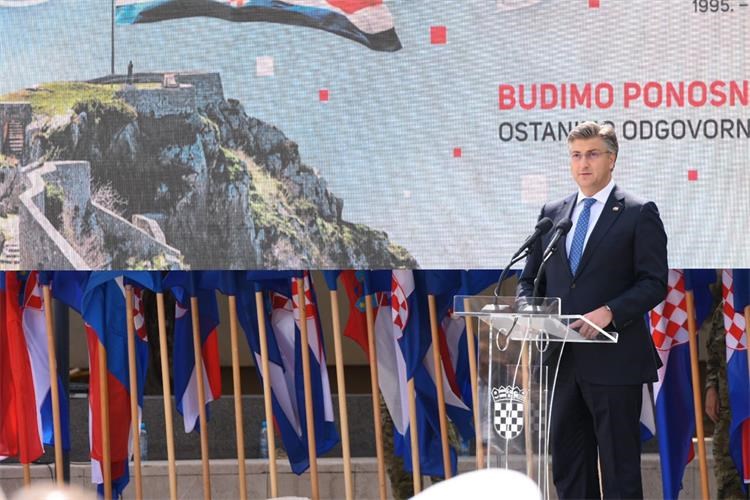
PM Andrej Plenkovic addresses the ceremony in Knin (Photo: Vlada.hr)
ZAGREB, Aug 5 (Hina) – Any innocent victim of the war, be they of Croat, Serb or any other ethnicity, deserves respect, Prime Minister Andrej Plenkovic said at a ceremony marking the 25th anniversary of Operation Storm in Knin on Wednesday.
In his address, he recalled a message of reconciliation addressed by the late President Franjo Tudjman in Vukovar in June 1997 to Croatian returnees and the local Serb population: “A victor who cannot forgive sows the seeds of future rifts and evils, and the Croatian people do not want that.”
Plenkovic said that this message should be borne in mind in building an inclusive, tolerant and forward-looking Croatia. “As a country that won a war that was imposed on it, with numerous innocent civilian victims, we regret all the casualties, especially civilians, and not just Croats, but Serbs and members of all other ethnic communities as well.”
Legitimate right to defence is not and cannot be excuse for wrongdoing
Plenkovic expressed regret for war crimes committed by Croats, saying that “a legitimate right to defence is not and cannot be an excuse for wrongdoing.” “Any such act is painful for the families of the victims and an ugly scar on the righteous face and defensive nature of the Homeland War,” he added.
“We are aware that our victory in Operation Storm was traumatic for many Croatian Serbs who primarily associate it with the departure of a portion of the Serb population from their homes in what were previously occupied areas. While for the majority of Croats this was a forced exodus organised and ordered by leaders of the Serb rebellion in Knin, many Serbs still see it as an exodus before Croatian forces,” the prime minister said.
Plenkovic said that 25 years on it was time to look at the complexity of what had happened then with equanimity. After Operation Storm, the Croatian state has made great efforts to ensure that Serb refugees who so wish a return to their homeland and much has been done in that regard, There are still difficulties that need to be removed so that they can feel equal and live in dignity, he added.
“We know that the whole time many Croatian Serbs in free areas of the country shared the fate of their Croatian compatriots, and many of them were in the Croatian army, of which we should be proud,” Plenkovic stressed.
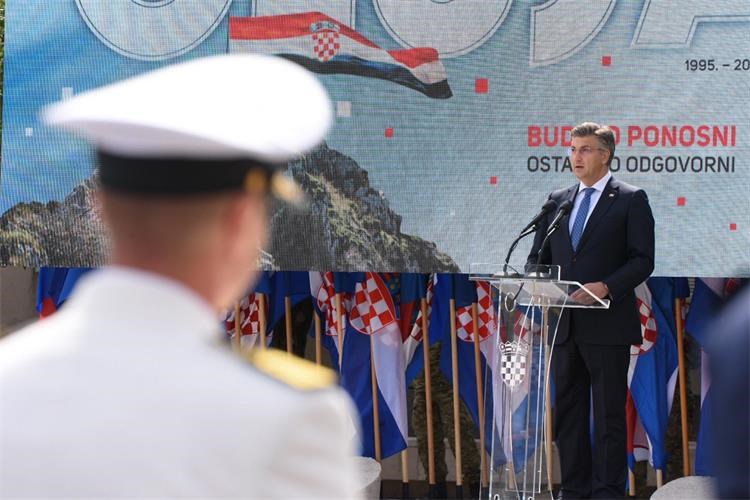
(Photo: Vlada.hr)
It is important that in Operation Storm the Croatian Serbs do not see only the exodus of their people but also the end of the war that paved the way for their return to Croatia, for everyone who so wishes.
“Finally, respects are due to every innocent victim, be they of Croat, Serb or any other ethnicity. Respects to thousands of innocent Croat victims from Vukovar to Dubrovnik … Respects to innocent Serb victims from Paulin Dvor to Varivode,” Plenkovic said.
“We do not question the legitimacy or righteousness of the Homeland War nor do we downplay the victory won in Operation Storm,” he added.
Humanity of a victor who regrets every lapse or war crime not prevented
Plenkovic said that this shows the magnanimity and humanity of a victor “who, despite everything, regrets every lapse or war crime that was not prevented.”
“We expect the same from all sections of Croatian society, especially from representatives of the Serbs in Croatia, who should also clearly condemn all the war crimes committed against Croats,” he stressed.
True reconciliation can only be built on the truth that is based on fact, on full cooperation in discovering all those still listed as missing and in seeking justice for all the victims, Plenkovic said, adding that all war crimes that do not fall under a statute of limitations will continue to be prosecuted regardless of the ethnicity of the victim or the perpetrator.
“Today, as the world copes with the biggest health threat in the last hundred years and with the gravest economic crisis since the Second World War, we must again strengthen our national unity around Croatian strategic goals. That’s why we should be inspired by the courage and self-abnegation of Croatian defenders and we will be able to cope with the great challenges facing us,” the prime minister said.
Plenkovic reiterated that Operation Storm was “legally legitimate, militarily inevitable and politically necessary,” adding that it was imperative for the Croatian leadership at the time to make it possible for displaced Croats to return to their homes and to reconnect parts of the country that had been severed until then.
With more than 20,000 dead and 15% of the housing stock damaged, Croatia suffered huge damage in the war which set it back 15 years in terms of development, Plenkovic said, noting that Operation Storm was also a turning point for peace and stability in southeastern Europe “which is why we can rightfully regard it as our greatest victory.”
The prime minister announced that a special law on civilian casualties of the Homeland War would be adopted to resolve painful issues still burdening Croatian society.
President: We have come a long way, we are not the society we were 25 years ago
Croatian President Zoran Milanovic said in Knin on Wednesday that 25 years after Operation Storm Croatia is not the same society it was then, stressing that unity requires talking about things that both bring people closer together and divide them.
“It is really an honour for me, and this is not an empty phrase, to speak on the occasion of the 25th anniversary of Croatia’s liberation. 25 years is a very long time in the formation and life of a human being. In a span of 25 years relations between states and relations in the world change. We have come a long way and we are not the same society we were 25 years ago,” Milanovic said in his address on the occasion of Victory Day, Homeland Thanksgiving Day, and War Veterans Day.
He said that this is something the prime minister, too, spoke about in his address, which “I warmly welcome and hope will become a reality.”
Milanovic went on to say that in democracy unity is not always fully possible but that it is necessary to talk together about things that bring us closer and that divide us, things that we view differently.
It is important to talk
“The views of someone from a big city, someone from a small city, of a Croat or a Serb are not necessarily always the same. What is important is to talk, raise issues and discuss them,” the president said.
Speaking about the stages of Croatia’s path to victory and relations between Croats and Serbs, Milanovic cited Winston Churchill, British Prime Minister during World War II, who said “In war: resolution, in defeat: defiance, in victory: magnanimity, in peace: goodwill.”
Recalling that the war in Croatia was imposed on the country, Milanovic noted that the difficult task of warfare was conducted by Croatia’s first president, Franjo Tudjman, as well as that the job done then was something Croatia could learn from today.
“That victory… was not accidental. It was a result of the work, planning, concentration and intelligence of hundreds of thousands of people. All of us who did not participate in it should be grateful to them,” he stressed.
The war started with a defeat and with the great suffering or displaced people, he added. Resistance at the beginning seemed futile but brave Croatian soldiers and their commanders won a victory, he said.
We should have been more magnanimous in victory, I appreciate Milosevic’s presence
“In that victory, we should have been more magnanimous and better organised, that is something the prime minister, too, has talked about. Fortunately, we never sank into an abyss of moral catastrophe. There were mistakes, there were also crimes, and they cost us later,” Milanovic said, adding that this was a big lesson.
Croatia later rectified that mistake, but a burden remains, he said.
“That is why I especially appreciate the presence of Deputy Prime Minister Boris Milosevic here today. This is a celebration, not a commemoration. We rejoice here and celebrate our successes. To come here and join Croats in celebrating a date, that is not an equation, that is the architecture of a heart and a deeply emotional issue and not a small thing,” he stressed.
As for present-day affairs, Milanovic said that Croatia had come a long way, has become a European state, and that it should do better in public affairs and take every euro of EU money allocated to it.
Relations with Serbia have been complicated for 100 years, they must be better
Speaking of relations between Croatia and Serbia, he said that they had been complicated for more than 100 years.
“There were conflicts, bloodshed, wars, civil wars, aggression and after that, we seem to be unable to enter a phase of normal relations in which respect and constructive behaviour will prevail. It is as if we are still burdened by things that are the consequence of the 1990s aggression,” he said, adding that he was aware that he was speaking as a Croat.
“But we are here. We have goodwill and faith and we want to cooperate, work and do business together,” he added.
“Simply to enter a boring, long constant, a new paradigm of relations. Relations between the two peoples in this part of Europe are very important. And when we trade accusations and argue, no one is scheming against us, they simply do not notice us,” said Milanovic.
He added that those relations must be better and that he would do all he can and dare to improve them as well as that it was up to the other side to try to do the same as well.
Gotovina: We are stronger and better people, ready to work for a better tomorrow
Retired lieutenant general Ante Gotovina said during the celebration of the 25th anniversary of Operation Storm in Knin on Wednesday, that by learning lessons from the past Croatians have become stronger and better people, ready to think optimistically and work today for a better tomorrow.
Speaking as a representative of veterans, he congratulated those present and underscored that Operation Storm, which took place a quarter of a century ago, had determined the country’s future and marked the beginning of the end of the war and the establishment of peace.
“The courage, sacrifice, determination and unity of our people from the start of the Homeland War and under the leadership of the first Croatian President Franjo Tudjman, wartime defence minister Gojko Susak and all the commanders of the General Staff were crucial for us to build a Croatian army in particularly unfavourable and difficult war circumstances, ready and capable of defending itself, putting an end to an imposed war and creating preconditions for lasting peace,” said Gotovina.
Horrors of war in collective conscience of the people and foundation of Croatian statehood
Gotovina added that the horrors of war and years of suffering of innocent people, the sacrifice of young soldiers and those who lost their lives and health, were part of the collective conscience of the Croatian people, having been built into the foundations of Croatian statehood.
“It is with pride and sorrow that we remember our friends, fallen and deceased comrades in arms. I greet you, dear families, with profound respect,” he said.
Gotovina said that 25 years of living in peace and security, Croatia is developing into a modern European democracy, a socially just state that cares for the smallest and most needy, a state in which all people, regardless of their differences, enjoy safety and freedom, equal rights and equal obligations.
“With the unity of all of us, from the first at the helm to the smallest, we will achieve the objectives and know how to respond to all the challenges of the time that we live in,” concluded Gotovina.
Asked by reporters later to say why members of wartime HOS forces and some other war units were not allowed to attend the ceremony in the main square in Knin, Gotovina said that “discipline has to exist in everything, even in freedom.”
Asked whether he was glad that Deputy Prime Minister Boris Milosevic from the ranks of the Independent Democratic Serb Party (SDSS) had attended today’s event, Gotovina said that the celebration was dignified and “that is good.”
Jandrokovic calls for building Croatia based on inclusion and solidarity
Parliament Speaker Gordan Jandrokovic said during the celebration that the Croatian people are celebrating with respect and pride and called for building a Croatia based on social justice, solidarity and inclusion.
“The Homeland War is the foundation of a free, independent, democratic and sovereign Croatia on which we are building our present and future,” underlined Jandrokovic during the main celebration of the Operation Storm anniversary, Victory Day, Homeland Thanksgiving Day and Croatian Veterans’ Day.
He called for achieving the vision of Croatia as a safe country with legal and social certainty based on social justice, solidarity and efficiency, a country with a strong and sustainable economy, a country of know-how and innovation in which young people will find an opportunity to achieve their personal and professional lives and contribute to its demographic vitality.
He underscored his satisfaction that despite the challenges during the times of the coronavirus pandemic today’s celebration is being held at the foot of the fortress where 25 years ago a free and proud Croatian flag flew symbolising the greatest victory in the Homeland War and the foundation of Croatia for centuries to come.
He expressed particular gratitude to veterans and their families who “heroically defended us and showed us what the freedom we live in today is.”
“We must not forget all those missing and must do everything so that their families learn of the fate of their loved ones,” Jandrokovic said.
He recalled that the Croatian army and police were established during the Homeland War and that they conduct their everyday duties honourably, selflessly and sometimes with great sacrifices but always responsibly when it comes to protecting the Croatian people.
“They showed that responsibility again at the start of the health crisis caused by the pandemic and after the earthquake in Zagreb, and that is why the Croatian people love and respect them,” he underlined.
“Today when the entire world is affected by an unprecedented crisis, our priority has to be to preserve the health and lives of the people but also their jobs,” said Jandrokovic convinced that we will overcome the challenges with joint forces and faith in our own abilities.
He stressed the importance of preserving awareness of national identity, knowing our past, preserving the Croatian language, culture and art, and promoting the highest values of the constitutional order.
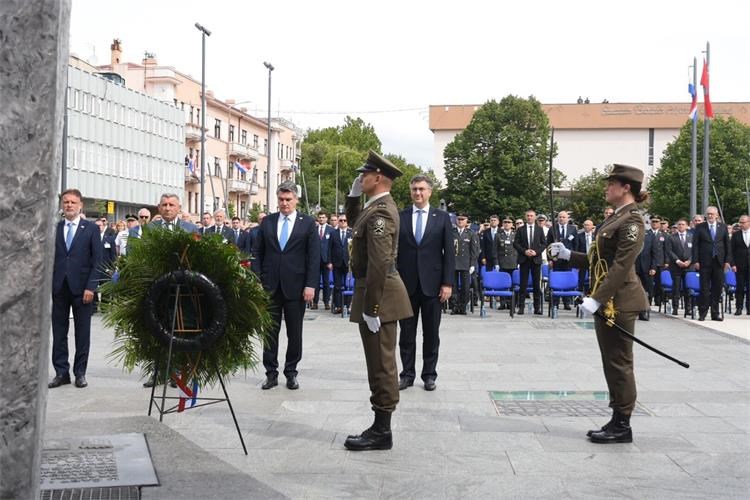
(Photo: Vlada.hr)
Such “responsible patriotism” motivates us to do all that not just for ourselves but for the community at large and for the progress of Croatian society as a whole, to fight for national interests, and to resolve all internal and external challenges together, to promote our international reputation and to strengthen its role in the new international order.
“Let us celebrate this day with dignity, joy and pride,” concluded Jandrokovic.
Milosevic: I consider my attendance in Knin as a pledge for the future
Deputy Prime Minister Boris Milosevic, of the Independent Democratic Serbian Party (SDSS), said on Wednesday that the government has the task to defuse tension in society in order to stop the spiral of hate, adding that he considers his attendance in Knin as a pledge for the future.
“I believe that this government and the parliamentary majority has the task to defuse and calm tension in society so that everyone testifies to a culture of peace with their own example and contributes to building a society of peace, tolerance and dialogue, in order to stop the spiral of hate so that the horrors of war are never repeated,” Milosevic said after the official ceremony marking the 25th anniversary of Operation Storm.
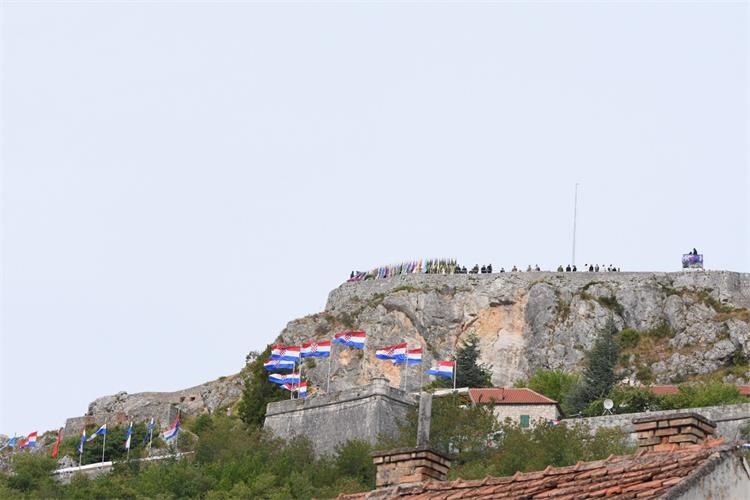
(Photo: Vlada.hr)
He believes that society has matured enough to respect all victims of the war regardless of their ethnicity, to accept that Serbs from Croatia had their suffering and victims and that remembrance of their victims should be respected.
He added that in today’s speeches by Prime Minister Andrej Plenkovic and President Zoran Milanovic he had heard messages of peace, reconciliation and future.
“The emotions are still fresh. I have heard messages of peace, reconciliation and future, so I consider my attendance as a pledge for the future and I consider this to be the first step,” Milosevic stressed.
Asked to comment on criticism from Belgrade of his arrival in Knin, Milosevic said that such criticism was to have been expected. He said that he primarily sees it as the talk of people who suffered pain and discrimination but have not felt justice because they had to leave their homes, adding that in that regard he doesn’t hold it against them.
